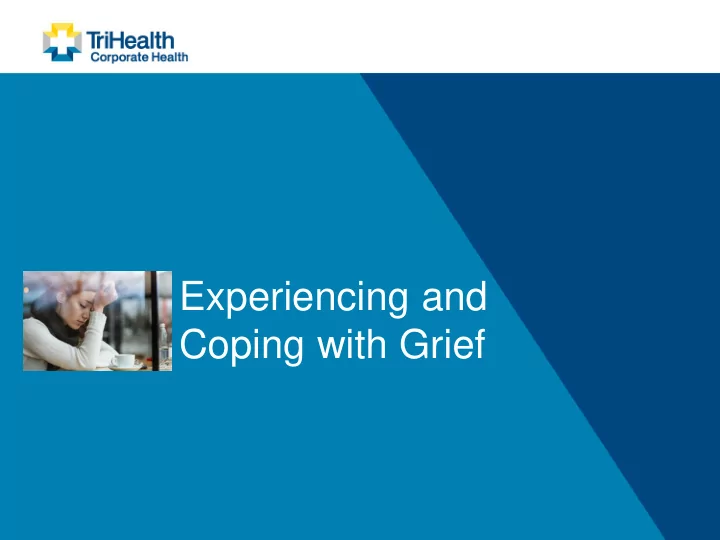

Experiencing and Coping with Grief
Experiencing and Coping with Grief Stages of Grief Being familiar with the different stages of grief and understanding that you can experience any or all of them in any order can help normalize your feelings. • Denial allows us to not focus on the loss at times and can act as a buffer so that a person can function and prepare for strong emotions. • Anger often accompanies loss. It is important to minimize stress and seek support from others. • Bargaining can happen when we feel unprepared for the life challenge we now face. It is helpful to focus on the positives as this stage can be damaging to your self-esteem. • Depression can occur. Focusing on self-care and following a daily routine can help; however, it is important also to seek professional support if depression associated with grieving hinders your ability to function and live life fully. • Acceptance happens when you begin to understand the loss that has occurred and are able to move forward with your life.
Experiencing and Coping with Grief Physiological Impact of Grief Grief affects each person differently; however, one of the most common physical responses to the grieving process is exhaustion . In addition to exhaustion, being emotionally and physically depleted can bring other physiological symptoms, including: • • Pain Migraines or Headaches • • Sleeping difficulties Dizziness • • Poor appetite or overeating Dry mouth • • Listlessness Crying • • Disorientation Numbness • Shakiness or trembling
Experiencing and Coping with Grief How to Help Someone Who is Grieving • Be present. One of the best things a friend can do for a griever is just to be there. • Listen. When a griever wishes to talk, you can provide a tremendous service by actively listening. Listen with patience and without judgment. • Accept the griever’s feelings. You can help by accepting whatever feelings – anger, guilt, sadness, fear – the griever is experiencing at the moment. Affirm those feelings by saying something like, “It’s OK to feel that way,” or “It must be a difficult time for you.” • Talk about the person who died. Friends sometimes think that “bringing it up” will remind the griever of the loss and cause more pain. Most grievers say their loss is always top-of-mind. They will be grateful you cared enough to ask. • Offer to help in a specific way. Instead of saying, “If there’s anything I can do to help, let me know,” offer to bring dinner over on a specific evening. • Be patient. Grieving the death of a loved one may take a long time.
Experiencing and Coping with Grief How to Help Someone Who is Grieving What t to to S Say ay: “I’m sorry” is often the simplest and the best. What at not ot to to Say ay Clichés and platitudes, such as: “It was God’s will.” “She’s better off this way.” • • “I know just how you feel.” “Life is for the living.” • • “You’ll get over it in time.” •
Recommend
More recommend